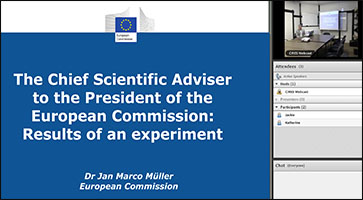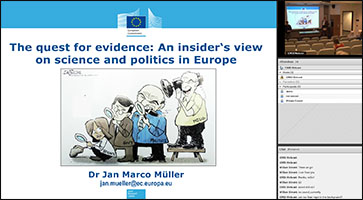CENTER Events |
September 29 Noontime Seminar
|
October 9 CIRES Distinguished Lecture Series |
by Dr. Jan Marco Müller, Policy Officer for International Relations, European Commission’s Joint Research Centre
|
November 19 at 12:00 PM |
by Dr. Jan Marco Müller, Policy Officer for International Relations, European Commission’s Joint Research Centre Sponsored by the Forum on Science Ethics and Policy, The Institute of Arctic and Alpine Research, and Center for Science and Technology Policy Research While policies both in the US and Europe are committed to be evidence-based, in practice political decisions are often not based on sound science. This is because science is just one element in the policy-making process, which follows also social, economic, and ethical / religious considerations to name just a few. The lecture analyses the relationship between science and policy and gives recommendations on how to enhance the impact of science on policy-making. Watch the webcast (12PM MST). |
December 1 Noontime Seminar |
by Sam Schramski, Visiting Postdoctoral Scholar, Federal University of Amazonas in Manaus, Brazil Dr. Schramski will present findings on his work on climate change perceptions among rural communities in the Brazilian Amazon. He will focus on the relationship between the role of news media as a national purveyor of information in the context of limited regional media outlets, as well as the lived experiences of individuals with whom he conducted research. Exploratory in nature, this talk will expand upon frameworks discussed in media theory and policy formation. It will attempt to shed new light on how we discuss climate change, particularly variability, in highly dynamic systems. Watch the webcast (12PM MST). |
2015 Mitchell Lecture on Sustainability, University of Maine |
by Roger Pielke, Jr., University of Colorado There are a range of controversies in the news these days where the role of expertise in decision making has proved challenging, from Deflategate in NFL football to the relationship of academics and industry in public debates over GMOs. Perhaps foremost among these, nations will gather in Paris in December to continue international negotiations on climate change, a generational challenge where progress has proven difficult. In this lecture, Pielke took a critical look at the contested terrain where science and politics meet. He has long studied this terrain and occasionally found himself embroiled in it. Pielke argued that science and expertise are essential to good decision making. In particular, he argued that better decision making requires more honest brokers in political debates and less partisanship played out through science. There are strong incentives against such honest brokering – for politicians and experts alike. However, better decision making requires that we better connect science and politics. Pielke offered a hopeful message about how this might be done. View presentation here. |




